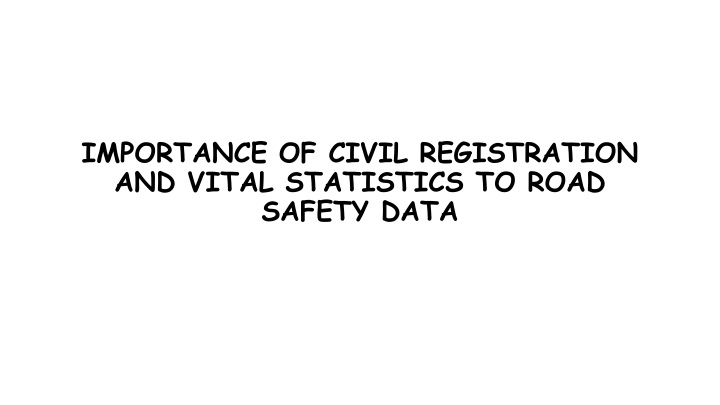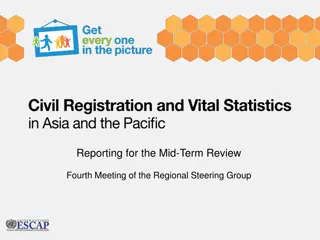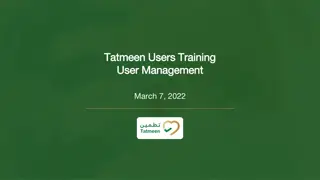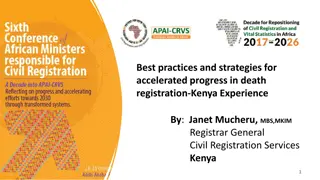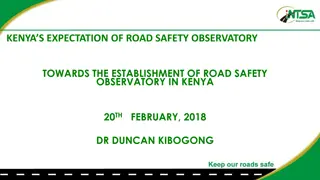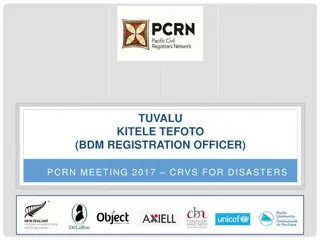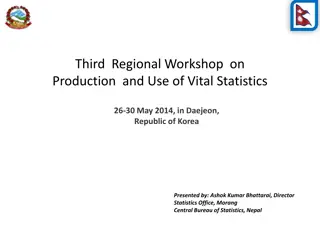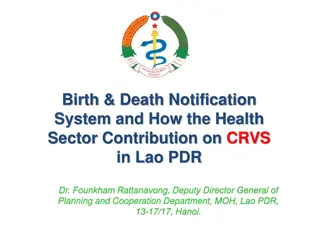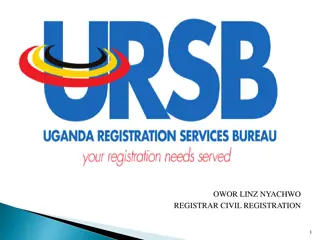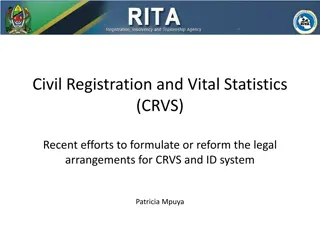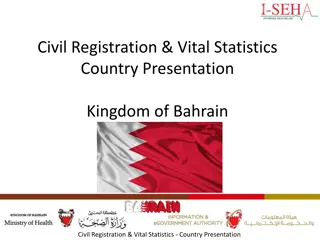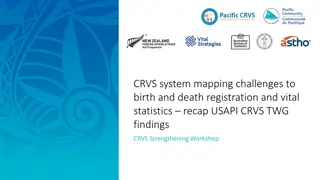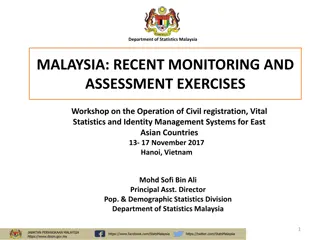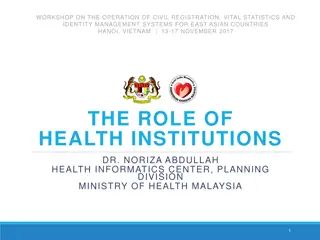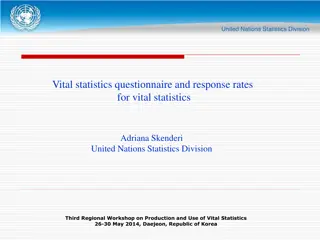Importance of Civil Registration and Vital Statistics in Road Safety Data
In most countries, civil registration systems are used to record vital events such as births, deaths, marriages, and divorces. The continuous and universal recording of these events is crucial for improving vital statistics and guiding policies and interventions. Road Safety Data collection is intertwined with Civil Registration and Vital Statistics, forming a fundamental framework for understanding and addressing road safety issues globally.
Download Presentation

Please find below an Image/Link to download the presentation.
The content on the website is provided AS IS for your information and personal use only. It may not be sold, licensed, or shared on other websites without obtaining consent from the author.If you encounter any issues during the download, it is possible that the publisher has removed the file from their server.
You are allowed to download the files provided on this website for personal or commercial use, subject to the condition that they are used lawfully. All files are the property of their respective owners.
The content on the website is provided AS IS for your information and personal use only. It may not be sold, licensed, or shared on other websites without obtaining consent from the author.
E N D
Presentation Transcript
IMPORTANCE OF CIVIL REGISTRATION AND VITAL STATISTICS TO ROAD SAFETY DATA
INTRODUCTION In most countries, a civil registration system is used to record statistics on vital events, such as births, deaths, marriages, divorces and fetal deaths (RTCs, disasters, epidemic, terrorist attacks). This government administrative system creates a permanent record of each event.
INTRO CONTD Civil registration is defined by the UN as: the continuous, permanent, compulsory, and universal recording of the occurrence and characteristics of vital events
INTRO CONTD (live births, deaths, fetal deaths, marriages, and divorces) and other civil status events pertaining to the population as provided by decree, law or regulation, in accordance with the legal requirements in each country. 1
INTRO CONTD Development and strengthening of CRVS systems are important for improving the quality of a country s vital statistics, and for using this information to guide policies, programmes and interventions.
INTRO CONTD This broader concept has been captured in the UN definition of a vital statistics system as: the total process of: 1) collecting information by civil registration or enumeration on the frequency or
INTRO CONTD occurrence of specified and defined vital events, as well as relevant characteristics of the events themselves and the person or persons concerned; and 2) compiling, processing, analyzing, evaluating, presenting and disseminating these data in statistical form.
INTRO CONTD Almost 1.25 million people are killed on the world's roads every year, and tens of millions are seriously injured. Against this backdrop, Road Safety Data is not an exception, as Civil Registration and Vital Statistics forms part of the basic framework for the collection of road safety data. The Roads kill project, developed in 2013 by the Pulitzer Center on Crisis Reporting, is a useful example of a long-term reporting initiative in which road safety is considered an on-going public health crisis.
INTRO CONTD The centre-piece of the project is a dynamic interactive map that was built with data from WHO s Global status report on road safety 2013 and open source tools. Federal Road Safety Corps is the Government Agency with statutory responsibilities for road safety administration in Nigeria founded in 1988, the statutory functions includes making the highways safe for motorists and other road users as well as checking road worthiness of vehicles,
INTRO CONTD recommending works and infrastructures to eliminate or minimize accidents on the highways and educating motorists and members of the public on the importance of road discipline on the highways.
AIM This lecture is to acquit participants to the relevance of Civil Registration and Vital Statistics to Road Safety Data.
OBJECTIVE At the end of this lecture, participants should be able to know the following: 1. What Civil Registration and Vital Statistics is all about 2. The Nexus between CRVS and road safety practices in Nigeria 3. Importance of CRVS to Road Safety Data 4. Challenges of CRVS and Road safety data.
THE NEXUS BETWEEN CIVIL REGISTRATION AND VITAL STATISTICS AND ROAD SAFETY PRACTICES IN NIGERIA With the already established point at the introduction of this paper, we can therefore say that Civil Registration and Vital Statistics is a key foundation to the collection of road safety data in Nigeria. One of the key data of the FRSC is the drivers licence which is one of the vital means of Civil Registration in Nigeria. Another means of civil registration which the FRSC have is the vehicle plate number registration. Beyond the record of RTCs, causes, vitims etc, road safety data spans into proper record on vehicles and road users and so on.
IMPORTANCE OF CIVIL REGISTRATION AND VITAL STATISTICS TO ROAD SAFETY DATA Civil registration is the source and foundation of Road Safety Data. It establishes the legal identity of individuals and the legal relationship between FRSC and the citizens. Civil registration also helps to sharpen the efficacy and fairness in terms of dispensation of justice in FRSC as it concerns offenders and offences. For instance, civil registration records help to avoid identity fraud and ensure that services are correctly targeted. Vital statistics sourced from civil registration and vital statistics systems enable Governments to adequately plan for the present and future road safety needs of the population.
IMPORTANCE OF CIVIL REGISTRATION AND VITAL STATISTICS TO ROAD SAFETY DATA CONTD It helps the FRSC to develop and implement evidence-based policies and programmes, and to deliver services to the population especially in terms of rescue, drivers licence, plate number registration and matters relating to offenders and offences. Trustworthy statistics on levels and trends in mortality and causes of death as a result of RTCs help to identify public health threats and high-risk groups. Complete civil registration and vital statistics systems and the improved statistics they generate support the health sector and FRSC in determining what interventions and resources are needed and where as far as road safety is concerned.
IMPORTANCE OF CIVIL REGISTRATION AND VITAL STATISTICS TO ROAD SAFETY DATA CONTD The data on road safety from civil registration and vital statistics systems are also essential for calculating the indicators needed to track progress in road safety programmes. A well-functioning civil registration and vital statistics system can provide valuable information that is essential for tackling road safety issues.
CHALLENGES Weak country ownership and leadership in national civil registration and vital statistics systems: Many policymakers are still unaware of the value and importance of civil registration records to road safety data and nation building.
CHALLENGES CONTD Outdated laws and registration procedures: Many African countries still have laws inherited from colonial times that are no longer relevant to contemporary Africa. Registration procedures in the majority of countries are based on these outdated laws and regulations, which affects road safety data collection negatively.
CHALLENGES CONTD Organizational and infrastructure challenges: In most countries on the continent, registration structures date from the colonial era. At the time, registration records were narrowly defined following the traditions of colonial practice. Registration offices also tend to be based in urban areas, making them inaccessible to the majority of rural people. E.g Drivers lincence, vehicle reg, rescue, bookings and RTCs as it relates to road safety.
CHALLENGES CONTD Limited expertise: There is limited opportunity for formal education in civil registration and vital statistics in Africa. The civil servants that operate and manage civil registration and vital statistics systems on the continent have no formal training except through their exposure to civil registration laws and regulations.
CHALLENGES CONTD Underdeveloped public administration infrastructure: Availability of services at the local administration level is the first requirement for sustainable development and cost-effectiveness of civil registration and vital statistics in a country. However, many African countries are still biased towards urban-based public institutions and services. Nevertheless, recent decentralization programmes under way in the majority of African countries are a step in the right direction.
CHALLENGES CONTD Lack of properly articulated national standards, operational manuals and guidelines: The majority of African countries do not have operational and management guidelines that provide systematic procedures and directives to the registrars and practitioners of civil registration.
CHALLENGES CONTD Lack of monitoring and evaluation standards and procedures: Most African countries, including those with well-developed civil registration and vital statistics systems, do not have systematically developed standards to measure the coverage and completeness of the registration system or the content and quality of the statistics produced.
CHALLENGES CONTD Inadequate efforts in mainstreaming civil registration and vital statistics into national statistical systems: Most African countries have started preparing and implementing national strategies for the development of statistics, but in most instances civil registration and vital statistics have not been included in a comprehensive way or as an integral part of national statistical systems.
CONCLUSION It can be inferred from the analysis earlier stated that civil registration and statistics is vital to the syncronization and collection of road safety data for record purpose and to shapen or influence FRSC activities as well as policies. It is the basis for which plans for the present and the future can be achieved in consideration of the yearly target of the corps.
CONCLUSION CONTD By extension, the need for civil registration and vital statistics in collection of road safety data is informed by the fact that the Federal Road Safety Corps, being an integral part of the Nigerian security formation, requires an effective data system to efficiently function.
REFERENCE -Civil Registration and Vital Statistics; WORLD HEALTH ORGANISATION REGIONAL OFFICE FOR THE EASTERN MEDITERRANIAN report from: http://www.emro.who.int/civil-registration-statistics/about/what-are-civil-registration-and-vital-statistics-crvs-systems.html -MAKING EVERYONE VISIBLE; Why improving civil registration and vital statistics systems in Africa is important from: https://www.uneca.org/sites/default/files/uploaded-documents/Statistics/CRMC3/making_everyone_visible_en.pdf
